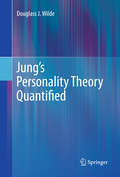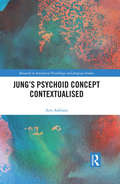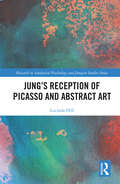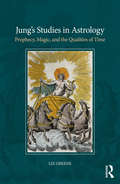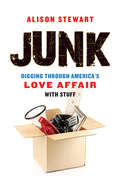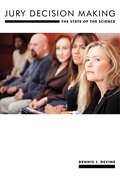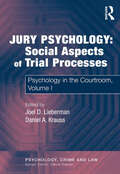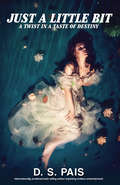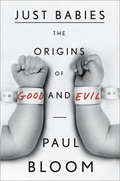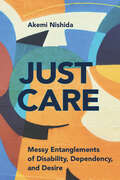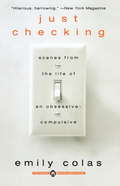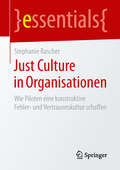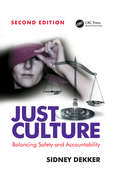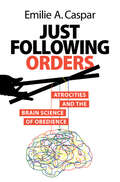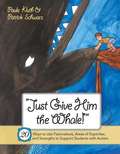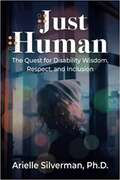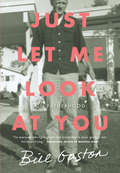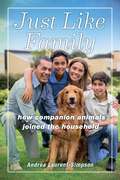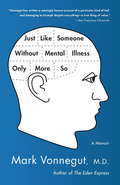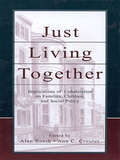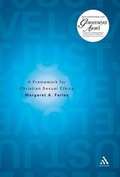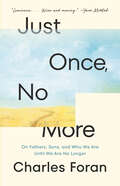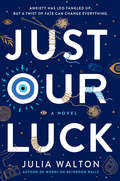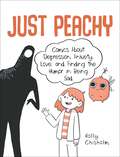- Table View
- List View
Jung’s Personality Theory Quantified
by Douglass J. WildeJung's Personality Theory Quantified fills an urgent need for professionals using the Myers-Briggs Type Indicator® (MBTI) to map it on to the cognitive modes of Jung's personality theory, avoiding potential logical errors in the traditional "type dynamics" method. It furthers Jung's original concepts while placing them on a solid axiomatic basis not possessed by other personality theories. Bringing these quantitative findings to the millions of MBTI users - managers, consultants, counsellors, teachers, psychoanalysts and human resource professionals - will require further education of those already certified to administer the instrument according to type dynamics. For this reason numerical exercises follow most chapters to make the book a source reference for briefer workbooks usable in enhanced certification programs. Backed by quantitative theory and new graphical methods, the pioneering qualitative typology work of Myers and Briggs is thus extended to yield deeper understanding of the vital topics of human personality, creativity and human relations. Jungian psychoanalysts may find Jung's Personality Theory Quantified helpful in organizing complicated clinical information and it can also enhance the work of MBTI practitioners worldwide.
Jung’s Psychoid Concept Contextualised (Research in Analytical Psychology and Jungian Studies)
by Ann AddisonJung’s Psychoid Concept Contextualised investigates the body-mind question from a clinical Jungian standpoint and establishes a contextual topography for Jung’s psychoid concept, insofar as it relates to a deeply unconscious realm that is neither solely physiological nor psychological. Seen as a somewhat mysterious and little understood element of Jung’s work, this concept nonetheless holds a fundamental position in his overall understanding of the mind, since he saw the psychoid unconscious as the foundation of archetypal experience. Situating the concept within Jung’s oeuvre and drawing on interviews with clinicians about their clinical work, this book interrogates the concept of the psychoid in a novel way. Providing an elucidation of Jung’s ideas by tracing the historical development of the psychoid concept, Addison sets its evolution in a variety of contexts within the history of ideas, in order to offer differing perspectives from which to frame an understanding. Addison continues this trajectory through to the present day by reviewing subsequent studies undertaken by the post-Jungian community. This contextual background affords an understanding of the psychoid concept from a variety of different perspectives, both cultural and clinical. The book provides an important addition to Jungian theory, demonstrating the usefulness of Jung’s psychoid concept in the present day and offering a range of understandings about its clinical and cultural applications. This book will be of great interest to the international Jungian community, including academics, researchers and postgraduate students engaged in the study of Jungian or analystical psychology. It should also be essential reading for clinicians.
Jung’s Reception of Picasso and Abstract Art (Research in Analytical Psychology and Jungian Studies)
by Lucinda HillThis book explores the nature of Jung’s understanding of modern art, in particular his reception to the work of Picasso and his striking prejudice shown in his controversial essay of 1932. Offering an important contribution towards understanding Jung’s attitudes towards Picasso and modern art, the book addresses the impact that Jung’s unwillingness to engage in a deeper exploration of modern artforms had on the development of his psychological ideas. It explores and uncovers the reasons for Jung’s derogatory view of Picasso and abstract art more generally, revealing how Jung was unable to remain objective due to his own complex and equally fascinating relationship with art and the psychology of image making. The book argues that modern art parallels Jung’s interests by embracing the spirit of experimentation and using new imagery to challenge creative conceptions, which makes Jung’s attitudes towards modern art all the more surprising. Jung’s Reception of Picasso and Abstract Art will be of great interest to researchers, academics and those interested in analytical psychology, Jungian studies, art history and modernism, aesthetics and psychoanalysis.
Jung’s Studies in Astrology: Prophecy, Magic, and the Qualities of Time
by Liz GreeneC. G. Jung had a profound interest in and involvement with astrology, which he made clear in virtually every volume of the Collected Works, as well as in many of his letters. This ancient symbolic system was of primary importance in his understanding of the nature of time, the archetypes, synchronicity, and human fate. Jung’s Studies in Astrology is an historical survey of his astrological work from the time he began to study the subject. It is based not only on his published writings, but also on the correspondence and documents found in his private archives, many of which have never previously seen the light of day. Liz Greene addresses with thoroughness and detailed scholarship the nature of Jung’s involvement with astrology: the ancient, medieval, and modern sources he drew on, the individuals from whom he learned, his ideas about how and why it worked, its religious and philosophical implications, and its applications in the treatment of his patients as well as in his own self-understanding. Greene clearly demonstrates that any serious effort to understand the development of Jung’s psychological theories, as well as the nature of his world-view, needs to involve a thorough exploration of his astrological work. This thorough investigation of a central theme in Jung’s work will appeal to analytical psychologists and Jungian psychotherapists, students and academics of Jungian and post-Jungian theory, the history of psychology, archetypal thought, mythology and folklore, the history of New Age movements, esotericism, and psychological astrology.
Junk: Digging Through America's Love Affair with Stuff
by Alison StewartWhen journalist and author Alison Stewart was confronted with emptying her late parents' overloaded basement, a job that dragged on for months, it got her thinking: How did it come to this? Why do smart, successful people hold on to old Christmas bows, chipped knick-knacks, and books they will likely never reread? Junk details Stewart's three-year investigation into America's stuff. Stewart rides along with junk removal teams like Trash Daddy, Annie Haul, and Junk Vets. She goes backstage at Antiques Roadshow, and learns what makes for compelling junk-based television with the executive producer of Pawn Stars. And she even investigates the growing problem of space junk--23,000 pieces of manmade debris orbiting the planet at 17,500 mph, threatening both satellites and human space exploration. But it's not all dire. Readers will also learn that there are creative solutions to America's crushing consumer culture. The author visits with Deron Beal, founder of FreeCyle, an online community of people who would rather give away than throw away their no-longer-needed possessions. She spends a day at a Repair Café, where volunteer tinkerers bring new life to broken appliances, toys, and just about anything. Junk is a delightful journey through 250-mile-long yard sales, resale shops, and packrat dens, both human and rodent, that for most readers will look surprisingly familiar.
Jury Decision Making: The State of the Science (Psychology and Crime #8)
by Dennis J. DevineWhile jury decision making has received considerable attention from social scientists, there have been few efforts to systematically pull together all the pieces of this research. In Jury Decision Making, Dennis J. Devine examines over 50 years of research on juries and offers a "big picture" overview of the field. The volume summarizes existing theories of jury decision making and identifies what we have learned about jury behavior, including the effects of specific courtroom practices, the nature of the trial, the characteristics of the participants, and the evidence itself. Making use of those foundations, Devine offers a new integrated theory of jury decision making that addresses both individual jurors and juries as a whole and discusses its ramifications for the courts.Providing a unique combination of broad scope, extensive coverage of the empirical research conducted over the last half century, and theory advancement, this accessible and engaging volume offers "one-stop shopping" for scholars, students, legal professionals, and those who simply wish to better understand how well the jury system works.
Jury Psychology: Psychology in the Courtroom, Volume I (Psychology, Crime And Law Ser.)
by Daniel A. KraussThe first of a two-volume set on the Psychology of the Courtroom, Jury Psychology: Social Aspects of Trial Processes offers a definitive account of the influence of trial procedures on juror decision-making. A wide range of topics are covered including pre-trial publicity and inadmissible evidence, jury selection, jury instruction, and death penalty cases, as well as decision-making in civil trials. In addition, a number of global issues are discussed, including procedural justice issues and theoretical models of juror decision-making. Throughout the volume the authors make recommendations for improving trial procedures where jurors are involved, and they discuss how the problems and potential solutions are relevant to courts around the world.
Jus Post Bellum and Transitional Justice
by Larry May Elizabeth EdenbergThis collection of essays brings together jus post bellum and transitional justice theorists to explore the legal and moral questions that arise at the end of war and in the transition to less oppressive regimes. Transitional justice and jus post bellum share in common many concepts that will be explored in this volume. In both transitional justice and jus post bellum, retribution is crucial. In some contexts criminal trials will need to be held, and in others truth commissions and other hybrid trials will be considered more appropriate means for securing some form of retribution. But there is a difference between how jus post bellum is conceptualized, where the key is securing peace, and transitional justice, where the key is often greater democratization. This collection of essays highlights both the overlap and the differences between these emerging bodies of scholarship and incipient law.
Just A Little Bit: A Twist In A Taste Of Destiny
by D. S. PaisJust a little bit is a collection of short stories illustrating the contribution of destiny towards life under unfavourable conditions. It speaks volumes about keeping up the hope under adverse situations, falling in love, facing tricky circumstances and yet winning, expecting the unexpected, not having hopes and getting rewarded, losing it all and gaining back, unusual relationships and friendships that defy time, feelings unexpressed, braving it all and finding happiness, pain and forgiveness and unexpressed love and so much more. Even in adverse conditions where there isn't any hope left, you can change destiny by simply trusting and directing your emotions towards what you firmly believe in. It also gives you an answer towards emotional attachment to a person and if we lose them, are there any possibilities of spending time with them after life. It deals with daily normal situations in life that destiny chooses to give a twist.
Just Babies: The Origins of Good and Evil
by Paul Bloom<P>A leading cognitive scientist argues that a deep sense of good and evil is bred in the bone. From John Locke to Sigmund Freud, philosophers and psychologists have long believed that we begin life as blank moral slates. Many of us take for granted that babies are born selfish and that it is the role of society--and especially parents--to transform them from little sociopaths into civilized beings. <P>In Just Babies, Paul Bloom argues that humans are in fact hardwired with a sense of morality. Drawing on groundbreaking research at Yale, Bloom demonstrates that, even before they can speak or walk, babies judge the goodness and badness of others' actions; feel empathy and compassion; act to soothe those in distress; and have a rudimentary sense of justice. <P>Still, this innate morality is limited, sometimes tragically. We are naturally hostile to strangers, prone to parochialism and bigotry. Bringing together insights from psychology, behavioral economics, evolutionary biology, and philosophy, Bloom explores how we have come to surpass these limitations. <P> Along the way, he examines the morality of chimpanzees, violent psychopaths, religious extremists, and Ivy League professors, and explores our often puzzling moral feelings about sex, politics, religion, and race. In his analysis of the morality of children and adults, Bloom rejects the fashionable view that our moral decisions are driven mainly by gut feelings and unconscious biases. <P>Just as reason has driven our great scientific discoveries, he argues, it is reason and deliberation that makes possible our moral discoveries, such as the wrongness of slavery. Ultimately, it is through our imagination, our compassion, and our uniquely human capacity for rational thought that we can transcend the primitive sense of morality we were born with, becoming more than just babies. <P>Paul Bloom has a gift for bringing abstract ideas to life, moving seamlessly from Darwin, Herodotus, and Adam Smith to The Princess Bride, Hannibal Lecter, and Louis C.K. Vivid, witty, and intellectually probing, Just Babies offers a radical new perspective on our moral lives. <P><b>A New York Times Bestseller</b>
Just Care: Messy Entanglements of Disability, Dependency, and Desire (D/C: Dis/color)
by Akemi NishidaJust Care is Akemi Nishida’s thoughtful examination of care injustice and social justice enabled through care. The current neoliberal political economy has turned care into a business opportunity for the healthcare industrial complex and a mechanism of social oppression and control. Nishida analyzes the challenges people negotiate whether they are situated as caregivers, receivers, or both. Also illuminated is how people with disabilities come together to assemble community care collectives and bed activism (resistance and visions emerging from the space of bed) to reimagine care as a key element for social change. The structure of care, Nishida writes, is deeply embedded in and embodies the cruel social order—based on disability, race, gender, migration status, and wealth—that determines who survives or deteriorates. Simultaneously, many marginalized communities treat care as the foundation of activism. Using interviews, focus groups, and participant observation with care workers and people with disabilities, Just Care looks into lives unfolding in the assemblage of Medicaid long-term care programs, community-based care collectives, and bed activism. Just Care identifies what care does, and asks: Are some people’s needs more sacred and urgent than others?
Just Checking: Scenes from the Life of an Obsessive-compulsive
by Emily ColasJust Checking: scenes from the life of an obsessive-compulsive was written by Emily Colas in the year 1998. Separated into four parts, Emily Colas provides snapshots of her daily life and the struggles that she faces as a result of her disorder: obsessive-compulsive disorder. The anecdotes of her life are written in a journal-like manner. The entries cover all aspects of her life from her cheating college boyfriend, to her family life and raising her two children, and to her interaction with friends. Throughout all of the excerpts Emily Cola’s frantic worries are evident, especially her constant fear of contracting diseases from the most common daily interactions with other humans. Colas’ most evident worry is that she will instantaneously contract a disease from the most minuscule sample of blood. When strangers, including the babysitter of her children, enter her home she becomes obsessed with every possible chance that they may infect her home. Therefore, Colas’ developed a system of checkpoints so she could determine whether or not the bathroom was used, a drawer opened, or anything touched. As the book proceeds the narrator begins to deal with her illness and she struggles to get better. Her marriage fell apart as a result of her disorder and she and her husband divorced. Eventually, after Colas’ married life disintegrated, she decided to take action and get help for her disorder. The narrative covers the stress that her condition placed on her family. A family member's negative response to the person's disorder can increase the OCD behavior. Colas started taking medication and made the conscious effort to stop obsessing over unimportant matters. The last section of entries demonstrates a healthier and more controlled person and the reader sees a change in the narrator.
Just Culture in Organisationen: Wie Piloten eine konstruktive Fehler- und Vertrauenskultur schaffen (essentials)
by Stephanie RascherIn unserer komplexen Arbeitswelt werden schnelle Entscheidungen immer wichtiger. Fehler sind dabei Teil des Arbeitsalltags und lassen sich selten ganz vermeiden. Entscheidend ist der konstruktive Umgang mit Fehlern, der ein schnelles Lernen der gesamten Organisation ermöglicht. Hochzuverlässigkeitsbranchen wie die Luftfahrt wissen dies seit Langem und praktizieren eine konstruktive Fehler- und Vertrauenskultur. Der Blick ist dabei auf die Ursachenanalyse gerichtet: Was genau ist geschehen? Wodurch wurde ein Fehler hervorgerufen? Wie lässt er sich künftig verhindern? Das essential veranschaulicht auf spannende und erfahrungsorientierte Art, wie Sie die Erfolgsprinzipien der Luftfahrt in Ihrem beruflichen Alltag nutzen können.
Just Culture: Balancing Safety and Accountability
by Sidney DekkerBuilding on the success of the 2007 original, Dekker revises, enhances and expands his view of just culture for this second edition, additionally tackling the key issue of how justice is created inside organizations. The goal remains the same: to create an environment where learning and accountability are fairly and constructively balanced. The First Edition of Sidney Dekker’s Just Culture brought accident accountability and criminalization to a broader audience. It made people question, perhaps for the first time, the nature of personal culpability when organizational accidents occur. Having raised this awareness the author then discovered that while many organizations saw the fairness and value of creating a just culture they really struggled when it came to developing it: What should they do? How should they and their managers respond to incidents, errors, failures that happen on their watch? In this Second Edition, Dekker expands his view of just culture, additionally tackling the key issue of how justice is created inside organizations. The new book is structured quite differently. Chapter One asks, ’what is the right thing to do?’ - the basic moral question underpinning the issue. Ensuing chapters demonstrate how determining the ’right thing’ really depends on one’s viewpoint, and that there is not one ’true story’ but several. This naturally leads into the key issue of how justice is established inside organizations and the practical efforts needed to sustain it. The following chapters place just culture and criminalization in a societal context. Finally, the author reflects upon why we tend to blame individual people for systemic failures when in fact we bear collective responsibility. The changes to the text allow the author to explain the core elements of a just culture which he delineated so successfully in the First Edition and to explain how his original ideas have evolved. Dekker also introduces new material on ethics and on caring
Just Following Orders: Atrocities and the Brain Science of Obedience
by Emilie A. CasparHow can obedience and carrying out orders lead to horrific acts such as the Holocaust or the genocides in Rwanda, Cambodia, or Bosnia? For the most part, it is a mystery why obeying instructions from an authority can convince people to kill other human beings, sometimes without hesitation and with incredible cruelty. Combining social and cognitive neuroscience with real-life accounts from genocide perpetrators, this book sheds light on the process through which obedience influences cognition and behavior. Emilie Caspar, a leading expert in the field, translates this neuroscientific approach into a clear, uncomplicated explanation, even for those with no background in psychology or neuroscience. By better understanding humanity's propensity for direct orders to short-circuit our own independent decision-making, we can edge closer to effective prevention processes.
Just Give Him the Whale!: 20 Ways to Use Fascinations, Areas of Expertise, and Strengths to Support Students with Autism
by Paula Kluth Patrick SchwarzWhen learners with autism have deep, consuming fascinations--trains, triangles, basketballs, whales--teachers often wonder what to do. This concise, highly practical guidebook gives educators across grade levels a powerful new way to think about students' "obsessions": as positive teaching tools that calm, motivate, and improve learning. Written by top autism experts and nationally renowned speakers Paula Kluth and Patrick Schwarz, this guide is brimming with easy tips and strategies for folding students' special interests, strengths, and areas of expertise into classroom lessons and routines. Teachers will discover how making the most of fascinations can help their students learn standards-based academic content boost literacy learning and mathematics skills develop social connections expand communication skills minimize anxiety and much more"Just Give Him the Whale" is packed from start to finish with unforgettable stories based on the authors' experience, firsthand perspectives from people with autism themselves, research-based recommendations that are easy to use right away, and sample forms teachers can adapt for use in their own classrooms. An enjoyable read with an eye-opening message, this short book will have a long-lasting impact on teachers' understanding of autism--and on their students' social and academic success.
Just Human: The Quest For Disability Wisdom, Respect, And Inclusion
by Arielle SilvermanBorn without sight, Dr. Arielle Silverman has never missed the visual. Being blind never bothered her much but, as she grew, she discovered others saw her blindness very differently. Many people saw her as either helpless or inspirational, but rarely did they see her as just human, with the same capacities and desires as her peers. Arielle has spent a lifetime exploring ways to foster respect and inclusion, not only for blind people like her, but for all of us whose bodies or minds differ from the norm. <P><P> In Just Human, she reflects on her formative years and presents unique anecdotes from her life that carry teachable moments for all of us. She recalls the feel of her mother’s embrace, the smell of her grandparents’ brisket, the inner sensations of a preteen crush, the music on her wedding day, and scholarly lessons from her dissertation research. Her words paint pictures from her mind’s eye: a vision of a world where we can radically accept ourselves and our fellow humans, while at the same time work to change systems of inequality. As she writes of the past and the present, Arielle looks toward the future, considering how we can build a more inclusive world for those who come after us.
Just Let Me Look at You: On Fatherhood
by Bill GastonFrom Giller-nominated, award-winning Bill Gaston, a tender, wry, and unforgettable memoir about alcohol, fishing, and all the things fathers and sons won't say to each otherSons clash with fathers, sons find reasons to rebel. And, fairly or unfairly, sons judge fathers when they take to drinking.But Bill Gaston and his father could always fish together. When they were shoulder-to-shoulder, joined in rapt fascination with the world under their hull, they had what all fathers and sons wish for. Even if it was temporary, even if much of it would be forgotten along with the empties.Returning to the past in his old fishing boat, revisiting the remote marina where they lived on board and learned to mooch for salmon, Bill unravels his father's relationship with his father, it too a story marked by heavy drinking, though one that took a much darker turn. Learning family secrets his father took to the grave, Gaston comes to understand his own story anew, realizing that the man his younger self had been so eager to judge was in fact someone both nobler and more vulnerable than he had guessed. Warm, insightful, and often funny, Just Let Me Look at You captures every father's inexpressible tenderness, and the ways in which the words for love often come too late for all of us.
Just Like Family: How Companion Animals Joined the Household (Animals in Context)
by Andrea Laurent-SimpsonWinner, 2023 Animals and Society's Distinguished Book Award, presented by the American Sociological AssociationThe rise and increasingly important role of companion animals in our familiesFrom homemade meals for our dogs to high-end feline veterinary care, pets are a growing multi-billion-dollar industry in the United States. In Just Like Family, Andrea Laurent-Simpson explores the expanding role of animals in what she calls “the multi-species family,” providing a window into a world where almost 95 percent of adults who share their homes with dogs and cats identify—and ultimately treat—their animal companions as legitimate members of their families. With an insightful eye, Laurent-Simpson examines why and how these animals have increasingly become an important part of our households. She highlights their various roles in our lives, including as siblings to our existing children, as animal children themselves, and in some cases, even as grandchildren, particularly as fertility rates decline and a growing number of younger couples choose to live a childfree lifestyle. Ultimately, Laurent-Simpson highlights how animals—and their place in our lives—have changed the structure of the American family in surprising ways. Just Like Family provides a fascinating inside look at our complex relationships with our beloved animal companions in the twenty-first century.
Just Like Someone Without Mental Illness Only More So: A Memoir
by Mark VonnegutMore than thirty years after the publication of his acclaimed memoir The Eden Express, Mark Vonnegut continues his story in this searingly funny, iconoclastic account of coping with mental illness, finding his calling, and learning that willpower isn’t nearly enough. Here is Mark’s life childhood as the son of a struggling writer, as well as the world after Mark was released from a mental hospital. At the late age of twenty-eight and after nineteen rejections, he is finally accepted to Harvard Medical School, where he gains purpose, a life, and some control over his condition. There are the manic episodes, during which he felt burdened with saving the world, juxtaposed against the real-world responsibilities of running a pediatric practice.Ultimately a tribute to the small, daily, and positive parts of a life interrupted by bipolar disorder, Just Like Someone Without Mental Illness Only More So is a wise, unsentimental, and inspiring book that will resonate with generations of readers.
Just Living Together: Implications of Cohabitation on Families, Children, and Social Policy (Penn State University Family Issues Symposia Series)
by Alan Booth Ann C. CrouterBased on the presentations and discussions from a national symposia, Just Living Together represents one of the first systematic efforts to focus on cohabitation. The book is divided into four parts, each dealing with a different aspect of cohabitation. Part I addresses the big picture question, "What are the historical and cross cultural foundations of cohabitation?" Part II focuses specifically on North America and asks, "What is the role of cohabitation in contemporary North American family structure?" Part III turns the focus to the question, "What is the long- and short-term impact of cohabitation on child well-being?" Part IV addresses how cohabiting couples are affected by current policies and what policy innovations could be introduced to support these couples. Providing a road map for future research, program development, and policymaking. Just Living Together will serve as an important resource for people interested in learning about variations in the ways families of today are choosing to organize themselves.
Just Love: A Framework for Christian Sexual Ethics
by Margaret A. Farley FarleyThis long-awaited book by one of American Christianity's foremost ethicists proposes a framework for sexual ethics whereby justice is the criterion for all loving, including love that is related to sexual activity and relationships. It begins with historical and cross-cultural explorations, then addresses the large questions of embodiment, gender, and sexuality, and finally delineates the justice framework for sexual ethics. Though" Just Love"s particular focus is Christian sexual ethics, Farleys framework is broad enough to have relevance for multiple traditions. Also covered are specific issues in sexual ethics, including same-sex relationships, marriage and family, divorce and second marriage, celibacy, and sex and its negativities.
Just Once, No More: On Fathers, Sons, and Who We Are Until We Are No Longer
by Charles ForanIn his poignant memoir, Charles Foran presents a portrait of his gruff-but-fond father wrestling with the end of life as Charlie acts as witness, solace, and would-be guide while facing his own mortality. What story can we tell ourselves and those we love, this radiant book asks, to withstand the inevitable mutability of time and self? A powerful meditation on fathers and sons, love and loss, and what it means to be alive "just once, no more."Dave Foran was a formidable man of few words, from a different era than his sensitive, literary son, Charlie. As a younger person, Dave had lived alone for months in the bush, overcome snow blindness, hauled a dead body across a frozen lake on a dogsled, dodged bullets in a bar, and gone toe-to-toe with a bear. Some aspects of his life were rollicking while others were more restrained: A decent father and a devoted husband, Dave was also emotionally distant, prone to laconic cynicism and a changeable mood. As Charlie writes: &“He struggled most days of his life with wounds he could not readily identify, let alone heal."The year Charlie turned 55, his 83-year-old father began a slow, final decline, and Charlie surprised himself by wanting to write about their relationship. On the surface, his motiavation was to reassure his father that he was loved. But there was also a deeper desire at work. &“Late into the middle of my own lifespan,&” Charlie writes, &“sadness took hold of my being . . . I wanted to say so frankly, never mind how uncomfortable it made me.&”In spare, haunting prose, Just Once, No More pulls on these delicate threads—unravelling a fascinating personal story and revealing its poignant universality.
Just Our Luck
by Julia WaltonFrom the author of Words on Bathroom Walls--now a major motion picture--comes a romance in the spirit of Dear Evan Hansen about overcoming anxiety--and about finding love and friendship in unlikely places."Bad luck follows lies." That was the first rule for life that Leo's Greek grandmother, Yia Yia, gave him before she died. But Leo's anxiety just caused a fight at school, and though he didn't lie, he wasn't exactly honest about how it all went down--how he went down. Now Leo's father thinks a self-defense class is exactly what his son needs to "man up.""Leave the Paros family alone." That was Yia Yia's second rule for life. But who does Leo see sitting at the front desk of the local gym? Evey Paros, whose family supposedly cursed Leo's with bad luck. Seeing that Leo is desperate to enroll in anything but self-defense class, Evey cuts him a deal: she'll secretly enroll him in hot yoga instead--for a price. But what could the brilliant, ruthless, forbidden Evey Paros want from Leo?Sharp, honest, and compulsively readable, Just Our Luck is as funny as it is heartwarming. Readers will root for Leo as he takes charge of his own destiny."A feel-good story, with shades of Holes and The Karate Kid" --BulletinDon't miss Words on Bathroom Walls, Julia Walton's brilliant debut!
Just Peachy: Comics About Depression, Anxiety, Love, and Finding the Humor in Being Sad
by Holly Chisholm"In this autobiographical collection of thoughtful and poignant comic vignettes, Chisholm explores her experiences with depression, anxiety, and love ." —BooklistJust Peachy is a comic series that explores what the day-to-day is like with depression and/or anxiety. The all-too-real cartoon protagonist gives readers a character to empathize with, and helps explain some of the not often talked about consequences and symptoms of having depression. The comics also explore the themes of heartbreak, finding love, dealing with stress, and capturing the magical moments in life that keep us going.Through dark humor and cute illustrations, the subject matter becomes a bit more bearable, allowing for honest discussion about things like treatment and getting through anxiety attacks, and providing some comfort in times of struggle.For anyone affected by mental illness, Just Peachy shows that you are not alone. Simply put, this is an encouraging collection of comics about being just okay sometimes.&“So brave of Holly Chisholm to share her struggles with mental health issues through this creative medium. Just Peachy will inspire others to connect to, navigate through, and recover from their own day-to-day trials and tribulations of living with a mental illness. Well done!&” —Dr. Carlin Barnes and Dr. Marketa Wills, authors of Understanding Mental Illness and founders of Healthy Mind MDs
